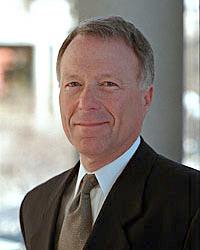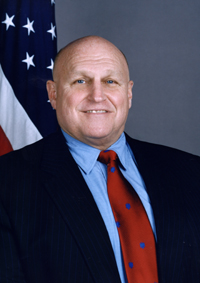Plame affair
The Plame affair describes a political scandal in the United States surrounding the Iraq war . After Joseph Wilson, a former US ambassador to Iraq and opponent of the Iraq war under the presidency of George W. Bush , publicly and heavily criticized the Iraq campaign in 2003, his wife Valerie Plame's undercover CIA agent activities were turned over by employees of the Bush administration the media ripped through and she was exposed. Valerie Plame and Joseph Wilson attributed this to an act of revenge by the then administration under President George W. Bush.
development
Valerie Plame (born August 13, 1963) is the wife of the former American diplomat Joseph C. Wilson IV and was an employee of the CIA . Shortly before the US invasion of Iraq in 2003, Wilson traveled to the African state of Niger on behalf of the US government to investigate evidence of the purchase of uranium by Iraq. According to his testimony, the trip revealed that the suspicion was completely unfounded and presumably based on forged documents, which was later confirmed by the International Atomic Energy Agency (IAEA). Wilson reported these results to the US government. The Bush administration , however, continued to use the alleged uranium purchases as one of the main political reasons for a war against Iraq.
On July 6, 2003, her husband published a critical article about his findings in the New York Times ("What I Didn't Find in Africa"). It has been established that people close to the Bush administration later leaked information about his wife's secret service activities to various major US media outlets, including the Washington Post . This is generally interpreted as a kind of act of revenge. The real affair was that the betrayal of Plame's secret service activity was a serious criminal offense under US law. With Valerie Plame, the cover company of the CIA Brewster-Jennings & Associates , which had provided the agent with the necessary cover, was also exposed. As a result, numerous journalists came under fire for covering their informants from government circles against criminal prosecution. A heated debate ensued over the role of the press in the US, and some journalists were temporarily detained .
Wilson took part in the film Uncovered: The War on Iraq and published a book in May 2004 (German Politics of Truth , German published June 2004).
In October 2005, US Vice President Richard Cheney's chief of staff , Lewis Libby , was arrested on charges of perjury and obstruction of justice , among other charges , and was sentenced to 30 months' imprisonment and a fine of $ 250,000. He also lost his license to practice as a lawyer. In July 2007 he received a partial pardon from the then US President and party friend George W. Bush , who released him from prison. In mid-2018, he was fully pardoned by Donald Trump .
Obtaining facts to justify an attack on Iraq under international law
From the point of view of the US government, an attack on Iraq is permitted under international law if Iraq attempts to obtain nuclear weapons.
Aluminum tubes
In 2002, a cargo of aluminum tubing destined for Iraq was intercepted. It was initially assumed that these tubes were intended for the construction of gas centrifuges for uranium enrichment . In this sense, among many others, the journalist Judith Miller published articles citing anonymous, government-related sources.
An investigative committee of atomic experts led by the former director of centrifuge development at Oak Ridge National Laboratory , physicist Houston G. Wood III , rejected this assumption as false.
In spite of everything, this became an essential US rationale for the war on Iraq in 2003.
Since 2005 it has been assumed that the Italian-made tubes in question are by no means suitable for uranium enrichment . Regardless of this, high-strength steel has not been used for such centrifuges since the 1950s.
Uranium oxide (yellowcake)
For the enrichment of uranium, uranium ( yellow cake ) is required in addition to the above-mentioned tubes that were later unmasked as unmasked . When contract documents appeared in Italy in 2002 that appeared to show that Saddam Hussein was trying to obtain uranium oxide in Niger , the professional diplomat Joseph Wilson IV was sent to Niger to investigate the threat situation. He came to the conclusion that the documents were crude forgeries. This was not taken into account, but Saddam Hussein's pursuit of nuclear weapons continued to be given as the justification for the war against Iraq under international law.
Wilson published an article "What I didn't Find in Africa" in March 2003 (after the occupation of Iraq) in the New York Times. His wife worked in the CIA's secret weapons of mass destruction division. Following this publication, columnist Robert Novak suggested in an article that Wilson had been commissioned to travel to Niger because of his wife's nepotist connections. Shortly after Novak also wrote the journalist Matt Cooper of the weekly magazine Time Magazine , two government officials had told him that Wilson's wife was a CIA agent. One of Cooper's sources is said to have been Bush's deputy chief of staff at the time, longtime campaign manager and leading Spin Doctor Karl Rove . Rove's involvement in the affair is also believed to be one of the main reasons for his retirement from the White House in August 2007.
Course of the investigation


This exposed the secret agent Valerie Plame and possibly a criminal offense under Title 50 Section 421 USC .
Public Prosecutor Patrick Fitzgerald received the investigation on December 30, 2003.
Penal provision
Title 50 Section 421 US Code provides for imprisonment or a fine if a security clearance intentionally disclose the identity of a secret agent in the service of the United States.
According to the prevailing opinion, a journalist who is provided with secret information does not fulfill the criminal offense, but his informant does.
It would be different if the journalist himself was the bearer of secrets, or had deliberately obtained secret material. Interesting here is the claim by Judith Miller , a journalist for the New York Times , that she was named a secret bearer in 2003 in the course of the search for Saddam Hussein's previously undetectable ABC weapons. She was also sentenced to prison term in 2005.
Problematic summons to journalists
On May 24, 2004, prosecutors summoned Matt Cooper to appear before the investigating court. A lawsuit by the weekly magazine against the subpoena was dismissed. The Vice President's Chief of Staff Lewis Libby released Cooper to testify about confidential discussions with him. Cooper complied with the summons and testified.
On August 12, 2004, the journalist Judith Miller was also summoned. Her newspaper, the New York Times , also sued the subpoena without success. Unlike Cooper, Miller refused but continued to testify and was therefore in Beugehaft taken. After 85 days in custody, Libby gave her permission to testify and decided to testify as well. Libby's attorney said she had permission to testify from the start.
Indictment against I. Lewis Libby
On October 28, 2005 charges were brought against Libby, who until then had been the Vice President's chief of staff. He immediately resigned from his position. The indictment was not made because of the originally investigated crime of exposing a secret agent, but because the public prosecutor accused Libby of telling the untruth several times during the preliminary investigation, sometimes under oath. In March 2007, he was found guilty of this and obstruction of justice by a Washington jury and sentenced in June 2007 to 30 months in prison and a $ 250,000 fine. However, the then incumbent American President George W. Bush exercised his right to a pardon in early July 2007 and waived the sentence because the sentence was excessive . The fine and the two-year probationary period remained in place.
In 2006, then Vice Secretary of State of the United States Richard Armitage confessed himself to being the source for the exposure of CIA agent Valerie Plame.
Cultural reception
filming
In 2008 Rod Lurie made the film Nothing but Truth . Lurie, who also wrote the screenplay, was inspired by the events of the Plame affair. The film is a journalist in the foreground, in coercive detention is taken, as it does not reveal its source.
In 2010, the American director Doug Liman took on the affair and filmed it under the title Fair Game with Naomi Watts in the role of Valerie Plame and Sean Penn as Joseph Wilson.
music
In 2008, the American indie folk band The Decemberists released the title Valerie Plame on their EP Always The Bridesmaid: Volume 1 , which lyrically picks up on their secret service activities and later exposure.
Web links
- US Code - Section 421: Protection of identities of certain United States undercover intelligence officers, agents, informants, and sources. (English)
- Indictment of October 28, 2005 against Lewis Libby ( Memento of October 28, 2005 in the Internet Archive ) (English, PDF; 153 kB)
- Michael Kinsley: Niger-Scooter-Plame-Gate. Slate from October 28, 2005 (English)
- Marc Pitzke : Whistleblower scandal 2003. In the line of fire of the US government. In: one day on Spiegel Online from July 12, 2013
Individual evidence
- ^ What I Didn't Find in Africa. - Did the Bush administration manipulate intelligence about Saddam Hussein's weapons programs to justify an invasion of Iraq? on: nytimes.com
- ↑ see also the English language Wikipedia
- ↑ Sons of bitches everywhere. - Joseph Wilson was a diplomat who quietly served his country - until he caught the government lying about Iraq and someone from the White House exposed his wife as a CIA agent. Now he is the symbolic figure for the protest against the policies of the US President. on: spiegel.de , June 14, 2004.
- ^ The Politics of Truth: A Diplomat's Memoir - Inside the Lies That Led to War and Betrayed My Wife's CIA Identity. 1st edition. Carroll & Graf, 2004, ISBN 0-7867-1378-X . (German: Politics of Truth. The lies that can cost Bush the future. S. Fischer Verlag, 2004, ISBN 3-10-049220-X )
- ↑ nytimes.com , April 13, 2018: Trump pardoned Scooter Libby for his convictions on perjury and obstruction of justice charges stemming from the CIA leak case (April 13, 2018)
- ↑ Michael Isikoff: The Rove Factor? In: Newsweek , July 11, 2005 (accessed March 12, 2016).
- ↑ "Exaggerated" Punishment Bush pardons Libby. on: n-tv.de , July 3, 2007.
- ↑ The day reality became fiction. In: Frankfurter Allgemeine Sonntagszeitung , p. 27.
